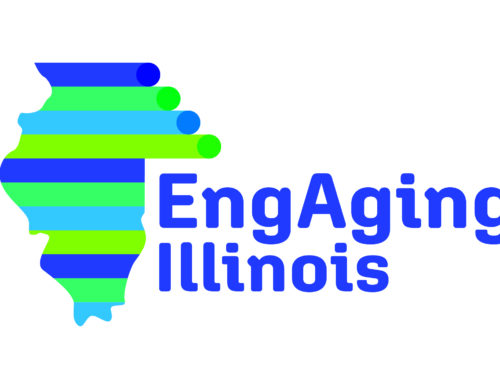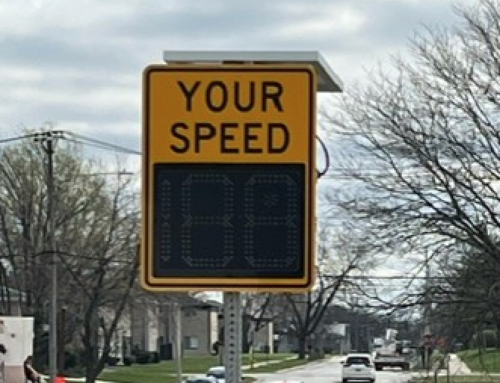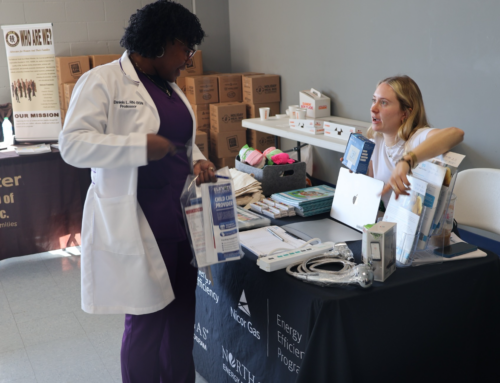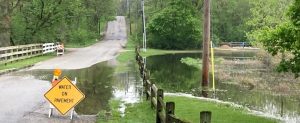 The Metropolitan Mayors Caucus (MMC) and the Chicago Metropolitan Agency for Planning (CMAP) are leading a regional climate planning effort in partnership with the Global Covenant of Mayors for Climate and Energy and need your input. Please join us for a series of webinars focusing on adapting to the impacts of climate change.
The Metropolitan Mayors Caucus (MMC) and the Chicago Metropolitan Agency for Planning (CMAP) are leading a regional climate planning effort in partnership with the Global Covenant of Mayors for Climate and Energy and need your input. Please join us for a series of webinars focusing on adapting to the impacts of climate change.
We kicked off this year-long effort last fall with a successful workshop focused on actions to mitigate climate change by reducing emissions of greenhouse gases in the region. Our approach is to build on the Greenest Region Compact Framework and connect local actions for strategic regional impact. The next step is to approach climate adaptation strategies in the same way.
We seek to engage our members and stakeholders through four online climate adaptation workshops, co-hosted by CMAP and the National Oceanic and Atmospheric Administration (NOAA). Local leaders and national experts will share information to help us understand potential impacts from climate change and use that information to adapt in our region and in our own communities. Our final webinar will be a workshop format in which we seek your input to shape regional and local adaptation strategies to be included in the regional climate plan.
Please join us. Staff, elected officials and citizen commissioners are welcome to participate.
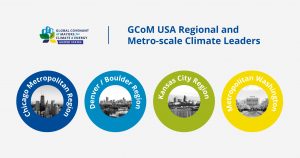 1. A Chicago Regional Climate Plan – Overview and Adaptation Introduction
1. A Chicago Regional Climate Plan – Overview and Adaptation Introduction
May 22, 2020, 1:00 – 2:30 pm
This session will recap the Regional and Metro-Scale Climate Leaders project, the role of MMC and CMAP, and the objectives of the regional climate planning project. Experts from NOAA will introduce the US Climate Resilience Toolkit and Steps to Resilience. Mayors will discuss impacts on our communities.
View the webinar materials:
- Agenda
- Presentation slides
- Recording
- Resources: CMAP’s Flood Susceptibility Index, Fourth National Climate Assessment, The Impacts of Climate Change on the Great Lakes
- Adaptation Planning Tools: U.S. Climate Resilience Toolkit, Disaster Resilience Scorecard for Cities
2. Climate Impacts & Hazards
May 29, 2020, 1:00 – 2:30 pm
Climate scientists from Argonne National Laboratory and the University of Illinois will present information on climate trends, models and the impacts of extreme weather events on our region. Experts from NOAA will guide us through the first Step to Resilience by exploring these hazards.
View the webinar materials:
3. Climate Risk and Vulnerability at the Nexus of Equity, Health, Public Works, and Planning
June 5, 2020, 1:00 – 2:30 pm
A panel of local experts and leaders will discuss our region’s climate-related risks from flooding, and extreme temperatures, and the damage they cause. They will discuss impacts on public health, infrastructure, operations and the economy. NOAA will help us assess these vulnerabilities and risks.
View the webinar materials:
- Agenda
- Presentation slides
- Recording
- Resources: American Public Works Association (APWA) Center for Sustainability Toolkit, CMAP ON TO 2050 Plan, CMAP Data Hub
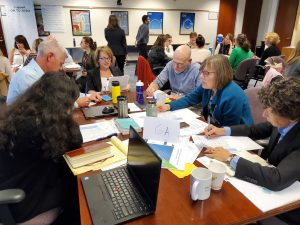 4. Regional Climate Adaptation Planning & Prioritization Virtual Workshop
4. Regional Climate Adaptation Planning & Prioritization Virtual Workshop
June 12, 2020, 1:00 – 3:00 pm
This last webinar will engage all participants in exercises to prioritize and plan adaptation strategies that address our greatest threats and protect our communities and our region. The strategies will build on the Greenest Region Compact (GRC) and utilize NOAA’s Steps to Resilience.
View the webinar materials:
We invite your partnership and participation in this important endeavor.
More about the Regional Climate Plan
The MMC Environment Committee and CMAP are building a Chicago regional climate action plan anchored in the GRC. It builds on foundational work done by CMAP to inventory greenhouse gas emissions in the region. With support from the Global Covenant of Mayors for Climate and Energy, we are building a plan that joins our GRC Communities with 10,000 global cities and 131 countries working to build sustainable and livable cities. Our region is one of four selected to demonstrate regional climate planning in the US.
The climate action planning process begins with an inventory of all the ways in which fossil fuels are used, a greenhouse gas (GHG) inventory identifies the most significant sources of pollutants contributing to climate change. A climate action plan then looks to address ways to reduce the use of carbon-based (fossil) fuels and sets a meaningful target for reduction. Our regional climate plan will also assess the risks associated with the impacts of climate change, like flooding and excessive heat, and propose strategies to protect our communities.
While climate change is an overwhelming, existential threat, municipalities of all sizes and strengths can make decisions and take actions that reduce risks and slow climate change. Through collaboration, all communities can join together to create a regional climate plan that guides future policies, actions and investments for a sustainable, vibrant region.
For questions on the webinars, please email cscott@mayorscaucus.org.



